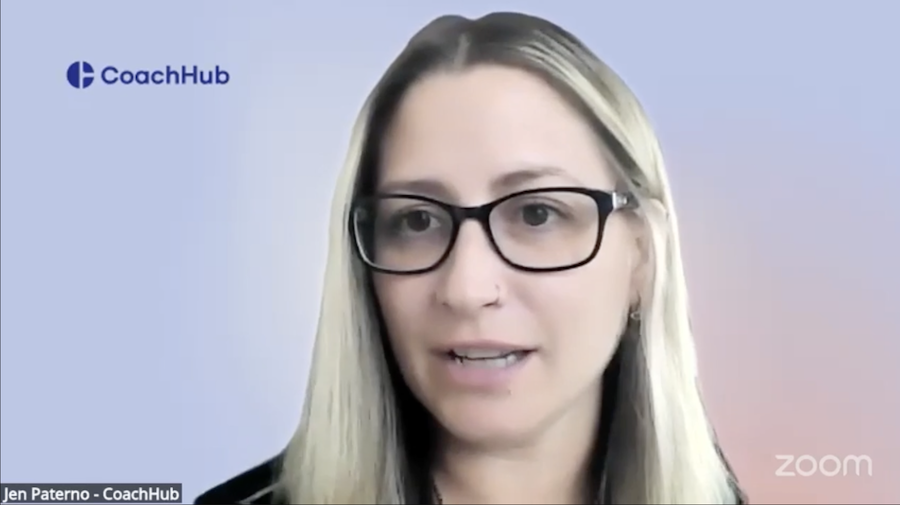Coaching as a Catalyst: Learning for Lasting Skill Development


As technology accelerates and workplace skills face rapid disruption, “there are still a significant number of current skills that are going to continue to become irrelevant or to be radically transformed by 2035. It’s not speculative hype,” said Jen Paterno, senior behavioral scientist at CoachHub, during a thought leadership spotlight at From Day One’s August virtual conference.
That shift isn’t just a matter of outdated knowledge. It’s a sign that new skills are rising faster than most organizations can absorb them. “It’s not that old skills die, it’s that new skills rise faster than most organizations can integrate them,” Paterno said.
The stakes are high. According to the World Economic Forum, nearly 40% of workers’ core skills are expected to change by 2030. Employers are investing heavily in upskilling and reskilling programs, yet many find that learning still falls short of driving lasting change on the job.
From Learning Events to Lasting Change
Too often, organizations mistake training for transformation. “The most common mistake we see is we go from seeing learning as a process to seeing it as an event,” Paterno said. That means workers attend workshops or complete online modules, but the knowledge doesn’t stick.

Science backs that up. The Ebbinghaus Forgetting Curve reminds us that seventy percent of learning is forgotten within a day if not applied, and only 12% of employees say they regularly use what they learn on the job, according to research from Harvard Business Review. The result is a familiar pattern: companies spend billions on training that fails to produce sustained behavior change.
What’s missing, Paterno says, is a bridge. “We aren’t facing a learning problem. We’re facing an integration problem,” she said. That’s where coaching enters the picture.
Coaching, Paterno says, doesn’t simply teach skills—it helps employees embed them by unlocking the emotional drivers behind behavior change. Drawing on research from Nobel laureate Daniel Kahneman, she noted that humans make decisions emotionally first, even when they appear rational.
Among the most powerful drivers of change are:
“Behavior change doesn’t happen in workshops,” Paterno said. “It happens in the messy, real-world moments of on-the-job application.” Coaching provides the psychological safety, accountability, and reinforcement that make those shifts sustainable.
Advances in AI are making it possible to scale coaching across the workforce. CoachHub, for example, uses AI to match coaches with employees, expand coaching across time zones and languages, and provide measurable dashboards to track outcomes.
AI tools, Paterno emphasized, are not a replacement for human coaches but a complement. “AI is going to allow you to touch larger populations,” she said. “It’s going to unlock coaching for your individual contributors as well.”
From Theory to Practice
The impact can be significant. Paterno cited a global manufacturing company that paired technical training with personalized coaching during a digital transformation. While the training explained the ‘what and the why,’ coaching focused on the ‘how,’ helping employees apply new skills, build confidence, and adapt to cross-functional roles.
Within six months, the company reported a 25% increase in internal mobility within re-skilled roles, along with higher employee confidence and collaboration, says Paterno. Employees who initially resisted the transformation began mentoring peers and proactively contributing to agile projects.
“The training gave them the ‘what and why,’” Paterno said. “The coaching gave them the ‘how’ to apply it."
For organizations grappling with AI disruption and evolving skill needs, the message is clear: learning alone is not enough. Sustained change requires integration, reflection, and accountability—and that’s the role of coaching. "When coaching follows training," Paterno said, “It transforms insight into behavior and scales culture change from the inside out.”
Editor’s note: From Day One thanks our partner, CoachHub, for sponsoring this webinar.
Chris O’Keeffe is a freelance writer with experience across industries. As the founder and creative director of OK Creative: The Language Agency, he has led strategy and storytelling for organizations like MIT, Amazon, and Cirque du Soleil, bringing their stories to life through established and emerging media.
(Photo by JLco - Julia Amaral/iStock)
The From Day One Newsletter is a monthly roundup of articles, features, and editorials on innovative ways for companies to forge stronger relationships with their employees, customers, and communities.